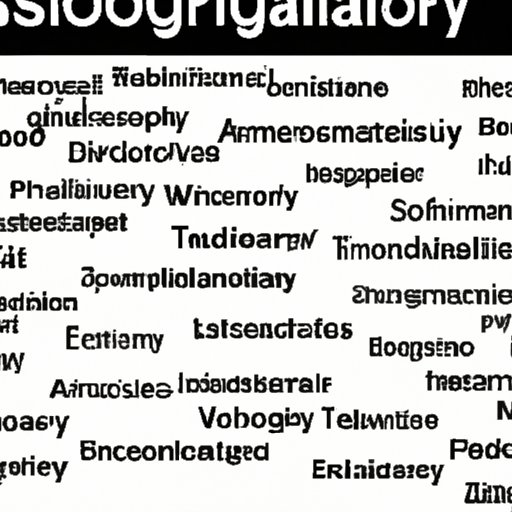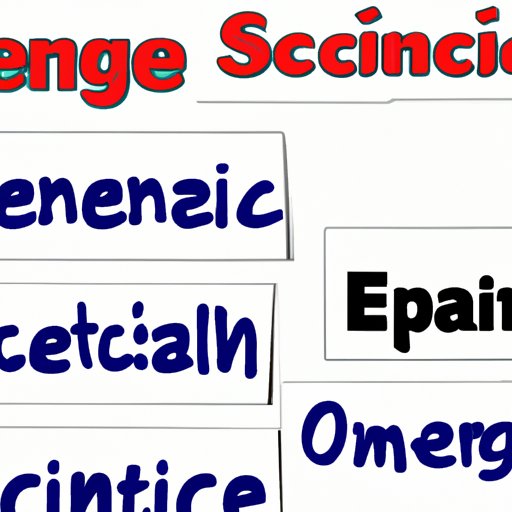Introduction
Science is a complex and diverse field with its own unique language. From the study of physics to the exploration of biology, science words can often be difficult to understand. But what exactly are science words?
Science words refer to the specialized language used in scientific fields such as mathematics, chemistry, physics, and biology. This language consists of technical terms, abbreviations, acronyms, and jargon that may not be familiar to those outside of the scientific community. Understanding this language is essential for being able to comprehend scientific concepts and research studies.
In this article, we’ll explore what science words are, provide a glossary of scientific terms, and offer tips on understanding the language of science. We’ll also introduce you to some of the most commonly used science words and explain their meanings.

A Glossary of Scientific Terms
A glossary is a list of words or phrases with definitions. When it comes to science, a glossary is useful for understanding the meaning of scientific terms. Let’s take a look at some common scientific terms and their definitions.
Atom: An atom is the smallest unit of matter that retains its chemical properties. Atoms are made up of protons, neutrons, and electrons.
Molecule: A molecule is a group of atoms bonded together. Molecules can be made up of two or more atoms of the same element, or they can be composed of atoms of different elements.
Organism: An organism is any living thing, such as a plant, animal, or microbe. Organisms are made up of cells, which are the basic units of life.
Photosynthesis: Photosynthesis is the process by which plants use sunlight to convert carbon dioxide and water into oxygen and glucose.
Exploring the Language of Science
Understanding the language of science is important for anyone interested in learning about scientific concepts. To do this, it’s important to become familiar with the terminology of science. This includes terms like “atom” and “molecule”, as well as other scientific jargon.
It’s also important to learn the meaning of scientific abbreviations and acronyms. These include terms like DNA (deoxyribonucleic acid), ATP (adenosine triphosphate), and RNA (ribonucleic acid). By becoming familiar with these terms, you can better understand scientific studies and concepts.
An Introduction to the Vocabulary of Science
The vocabulary of science consists of words used to describe scientific concepts and processes. These words can vary depending on the scientific discipline. For example, the language of biology differs from the language of physics. It’s important to be aware of the differences between scientific disciplines so that you can understand the terminology of each one.
Common science words include “theory”, “hypothesis”, “experiment”, and “data”. These words are used to describe scientific processes and concepts. Other commonly used science words include “variable”, “sample”, “model”, and “result”.
Commonly Used Science Words and Their Meanings
Now that you have an understanding of what science words are and why they’re important, let’s take a look at some of the most commonly used science words and their meanings.
- Theory: A theory is an explanation of a phenomenon based on observations and experiments. It is not necessarily proven to be true, but it is the best explanation available at the time.
- Hypothesis: A hypothesis is an educated guess about the cause of a phenomenon. It must be testable and falsifiable in order to be accepted as a scientific hypothesis.
- Experiment: An experiment is a procedure carried out to test a hypothesis or answer a scientific question. Experiments involve controlling variables and collecting data.
- Data: Data is information collected from an experiment or observation. Data can be qualitative or quantitative.
- Variable: A variable is a factor that can be changed in an experiment. Variables can be independent or dependent.
- Sample: A sample is a subset of individuals or objects chosen from a larger population. Samples can be used to make generalizations about the population.
- Model: A model is a representation of a system or phenomenon. Models can be physical, mathematical, or conceptual.
- Result: A result is the outcome of an experiment or study. Results can be used to draw conclusions about the hypothesis.

A Guide to Science Terminology
Learning the language of science can be an intimidating task. However, there are several resources available to help you understand scientific terms. Here are some tips for understanding science terminology:
- Take time to read and understand scientific papers. This will help you become familiar with the language of science.
- Look up unfamiliar terms in a scientific dictionary. This will help you understand the meaning of scientific words.
- Attend lectures and seminars on scientific topics. This will give you exposure to the terminology of science.
- Consult experts in the field. Talking to scientists can be a great way to learn the language of science.
In addition to these tips, there are several online resources available to help you learn the language of science. Websites such as Khan Academy and TED-Ed offer educational videos and articles on scientific topics. You can also find books on scientific terminology in your local library.

Essential Science Words Everyone Should Know
There are certain science words that everyone should know. These words are essential for understanding scientific concepts and research studies. Some of the most important science words include “theory”, “hypothesis”, “experiment”, “data”, “variable”, “sample”, “model”, and “result”.
Knowing these words is important because they form the foundation of scientific inquiry. Without them, it would be impossible to understand scientific concepts and research studies. Therefore, it’s critical for anyone interested in science to become familiar with these words.
Conclusion
Science words are an important part of the language of science. They are used to describe scientific concepts and processes, and they are essential for understanding scientific research. In this article, we explored what science words are and provided a glossary of scientific terms. We also discussed how to understand the language of science and introduced some of the most commonly used science words and their meanings.
By becoming familiar with the language of science, you can gain a better understanding of scientific concepts and research studies. So take the time to learn the terminology of science and become an expert in the language of science.
(Note: Is this article not meeting your expectations? Do you have knowledge or insights to share? Unlock new opportunities and expand your reach by joining our authors team. Click Registration to join us and share your expertise with our readers.)
